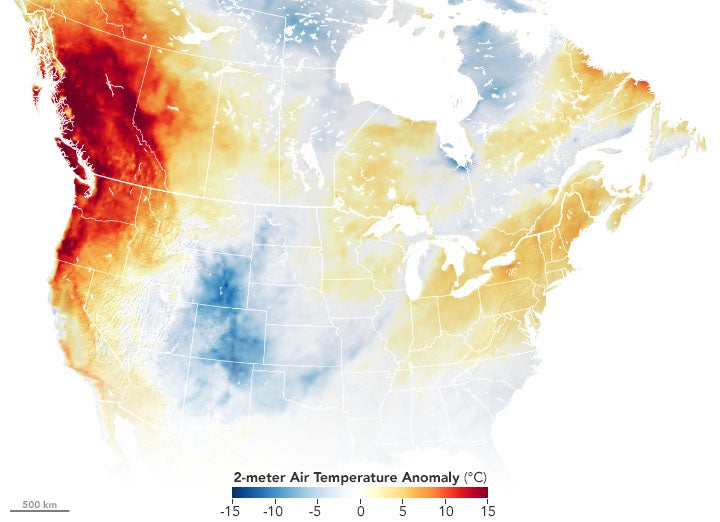Heat dome map: Where is record-breaking weather system causing wildfires and highs of nearly 50C?
High pressure zone in North America has shattered records

Hundreds of deaths in Canada and the US states of California, Oregon, and Washington have been linked to the historic heatwave that has baked North America’s west coast and shattered all-time temperature records.
Caused by what meteorologists have described as a “heat dome” of high pressure over the Pacific Northwest and Canada’s British Columbia, the impact has been worsened by human-caused climate change.
David Phillips, senior climatologist at Environment and Climate Change Canada, said climate change looked to be a key contributor – given the heatwave’s duration, extremes, and the fact it is setting new temperature highs a month earlier than the usual hottest time of year.
“In some of these places, their records are being annihilated,” Mr Phillips said. “It really is spectacular, unprecedented for us.”
Seattle, Portland and many other US cities have seen their all-time heat records shattered. Lytton, a town in central British Columbia, has broke Canada’s all-time temperature record three times. It now stands at the 121 Fahrenheit (49.6 Celsius) seen on Tuesday.
The risk of wildfires has risen in step with the soaring temperatures. Around a dozen wildfires were still raging across California on Wednesday, with the Lava Fire in Northern California’s Siskiyou County expanding to 13,300 acres.
US officials said on Tuesday that 52 wildfires were burning from Montana to California, with six states are under heat and fire alerts.
The heatwave in Canada is so intense that it has created the conditions for extreme wildfires – which have then sparked thunderstorms and lightning, in turn igniting further fires.
Daniel Swain, a meteorologist, said this “wildfire-associated pyroconvective event” was in all likelihood the “most extreme” he’d ever seen in his career.
One town in British Columbia was ordered to be evacuated on Wednesday after a fast-moving wildfire engulfed many of the area’s buildings.
The village of Lytton, with a population of over 200 people, was ordered to be evacuated after authorities raised the alarm for a rapidly deteriorating wildfire.
The very high temperatures or humidity conditions posed an elevated risk of heatstroke or heat exhaustion.
Oregon health officials said late Wednesday more than 60 deaths have been tied to the heat, with the state’s largest county, Multnomah, blaming the weather for 45 deaths since the heat wave began Friday.
British Columbia’s chief coroner office received reports of at least 486 “sudden and unexpected deaths” between Friday and Wednesday. Washington state authorities had linked more than 20 deaths to the heat, but that number was likely to rise.
Canadian authorities have issued heat warnings for southern Alberta and Saskatchewan. Heat warnings are also in place for parts of Washington, Oregon, Idaho and Montana.
Joe Biden’s administration said Wednesday it is hiring more federal firefighters – and immediately raising their pay – as officials ramp up response efforts for another destructive summer of intense wildfires across the western states.
“This is an area that has been under-resourced, but that’s going to change and we have to do it,” the US president told governors on Tuesday. “We can’t cut corners when it comes to managing our wildfires or supporting our firefighters. Right now we have to act and act fast.”
Canadian prime minister Justin Trudeau struck a sombre tone on the heatwave. “We’ve been seeing more and more of this type of extreme weather event in the past years. So realistically, we know that this heatwave won’t be the last.”
Additional reporting by agencies
Join our commenting forum
Join thought-provoking conversations, follow other Independent readers and see their replies
Comments